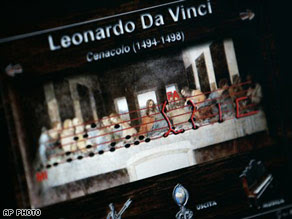Monday, November 26, 2007
The Ron Paul Phenomenon
Wednesday, November 21, 2007
Pro-Forma
Friday, November 16, 2007
Inauguration Day
Wednesday, November 14, 2007
The Great Bridge Scandal of 2007
Monday, November 12, 2007
No Problem
Sunday, November 11, 2007
Latest Crazy Idea to be Taken Seriously

A certain Giovanni Maria Pala, of Italy, claims that if you draw a musical score across Leonardo Da Vinci's "Last Supper" and put musical notes on the bread loaves and the hands of the disciples and read the result from right to left, you get a composition that Leonardo secretly worked into the painting. This has gotten a lot of press coverage for something so obviously, well, dotty.
Let me be honest here -- I haven't read a word of Pala's book. The news story claims he has some extrinsic evidence that the painting encodes a musical composition. Maybe he does. Maybe the whole thing is as true as, let's say, gospel.
But boy, I have my suspicions. My guess is that if you draw a score across any painting and choose your own rules about where the score goes and what items count as notes and whether you get to read left to right or right to left, you can come up with a pleasing tune. Heck, years ago researchers started making music by assigning notes to DNA strands (the DNA elements are named C, T, A, and G, so three of them are musical notes already, and if I recall correctly the researchers substituted B-flat for T), and it sounded pretty good.
My guess is that this is up there with the Bible Code -- a ludicrous attempt to claim that hidden messages were encoded into the Bible if you only chose the right starting point and read every nth letter, with the research getting to choose the starting point and the value of n, of course.
If anyone reads Pala's book and finds it persuasive, please let me know. But I'm not holding my breath.
